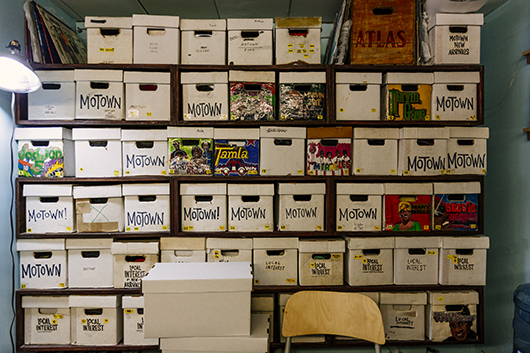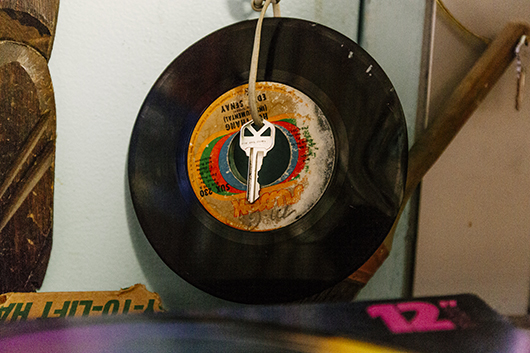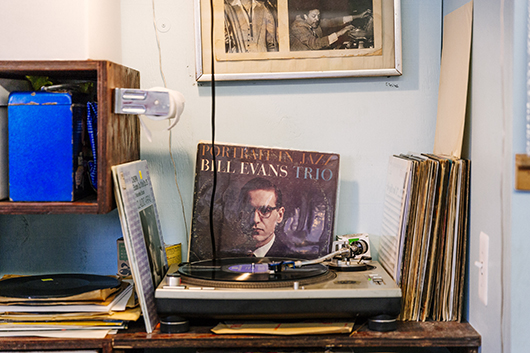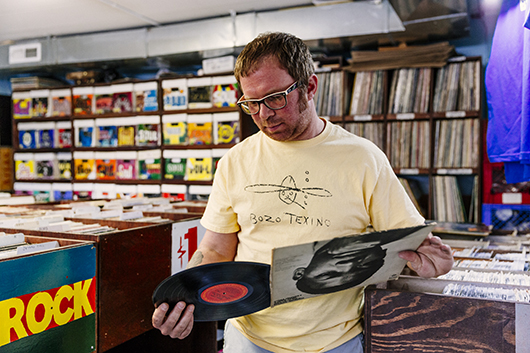Record Store Week: People’s Records
All week long, XLR8R will be taking a closer look at some of our favorite […]
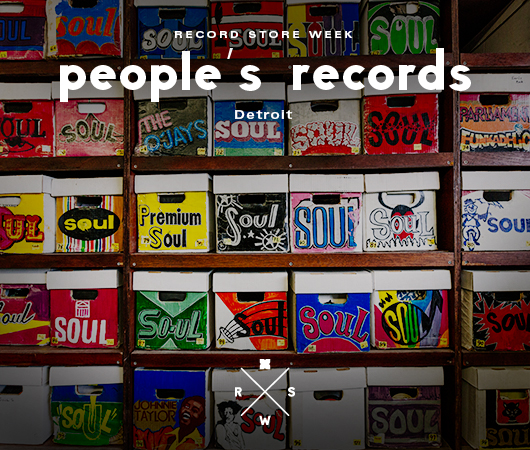
Record Store Week: People’s Records
All week long, XLR8R will be taking a closer look at some of our favorite […]

All week long, XLR8R will be taking a closer look at some of our favorite record shops from around the globe. Check out the entire ‘Record Store Week’ series here.
For those who have never set foot in the “Techno City,” or at least haven’t strayed outside the confines of the annual Movement Festival, it’s easy to imagine Detroit as the crumbling metropolis it’s often portrayed as in the media, a place filled with beautiful but empty skyscrapers, expansive abandoned factories, and blocks of burnt-out homes. At the same time, it’s just as easy to imagine Detroit as a dance music hotbed, the birthplace of techno that’s still home to many of the genre’s originators and a number of the United States’ top DJs and producers. There is truth in both sentiments; despite all of its struggles, Detroit is a city whose musical spirit is very much alive. Most people will point to the city’s numerous artists and the labels when asserting this notion, but on more of a street level, music retail is incredibly healthy in Detroit. When the renowned Record Time closed years ago, many feared that the rest of the city’s record stores would eventually follow suit, and some of them did. However, things have since stabilized, and even switched directions. Survivors like Desirable Discs, Detroit Threads, and Buy-Rite (now operating as Detroit Music Center) are thriving, Underground Resistance’s elusive Submerge continues to operate and host the Detroit Techno Museum, and new stores like Hello and People’s Records have opened for business.
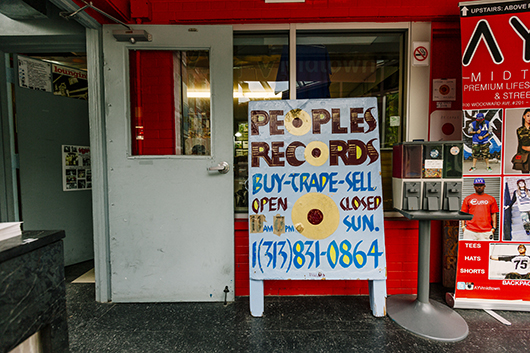
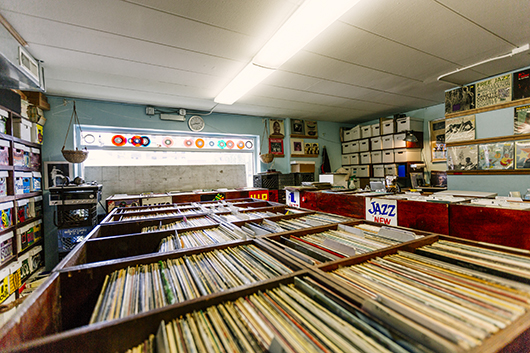
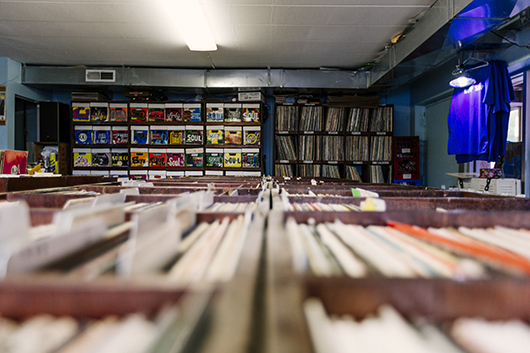
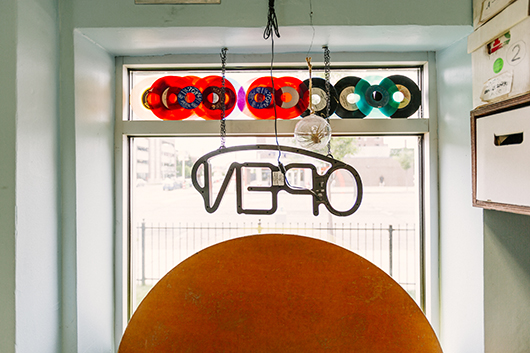
People’s Records is notable not simply because it’s a quality store, or because it’s in a good location, but because it seems to reflect the city’s impossible-to-pigeonhole nature. Situated near what was once called the Cass Corridor, the neighborhood has since been renamed Midtown to distance itself from the area’s violent history. It’s now a part of town that reflects Detroit’s mixed reality. Safer than it once was, this part of town is filled with history, not to mention the exceptional Detroit Institute of Art, renowned live music venues The Magic Stick and Majestic Theater, and Wayne State University’s campus. At the same time, it’s also home to a small fleet newly founded yoga studios, coffee shops, and restaurants. Nestled in a small shopping center, People’s Records is almost a perfect representation of the neighborhood, as it sits opposite a boutique coffee shop and bar, a florist, and yes, some of the omnipresent vacant buildings Detroit is known for.
Owner Brad Hales opened the store in 2003 after working at Detroit’s Desirable Discs and Ann Arbor’s Encore Records and then taking a break to work outside music. Brad recounts:
“All I could think was, ‘The records are getting away!’ I [opened the store] because I [was] trying to archive a lot of local stuff, music that is very difficult to find here; most copies of the records from my own backyard that I like are in England, Europe, and Japan. People here need to hear that stuff, and become familiar with it. Working in other shops in the ’90s, I would meet overseas dealers and DJs and they would be looking for local things that weren’t on my radar yet.”
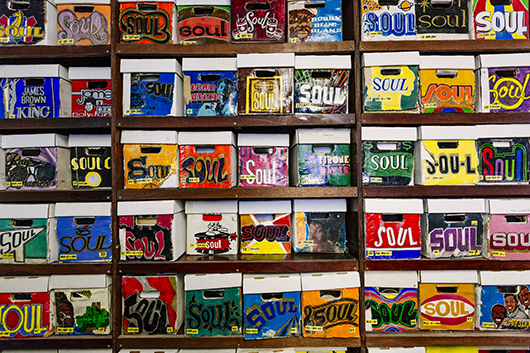
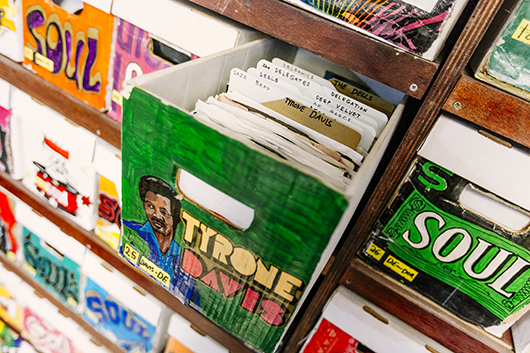
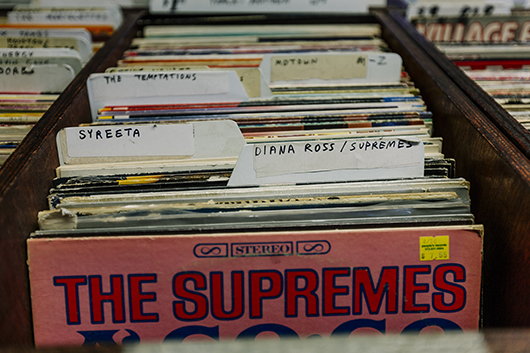
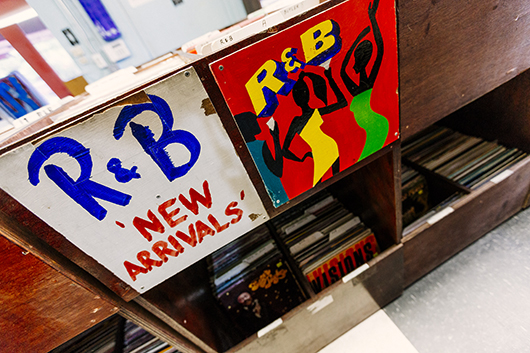
The store’s original location was in the basement of an apartment building that burned down, which could have ended People’s Records. In the process of putting out the blaze, the fire department left the store completely submerged in water, destroying nearly all of the vinyl Hales had accumulated in his first five years of operation. This damage left the store in a precarious position, as the insurance covered his relocation, but didn’t provide enough to restock the shelves. Thankfully, Hales had support from the local community. “Kenny Dixon Jr. [a .k.a. Moodymann] gave me five boxes of his own personal records after we found a new location,” he says. “That gesture meant the world to me. It was a great inspiration, right when I needed it. I opened again six months later, and here we are today, six years later.”
The current People’s Records retail space captures a similar feeling to the original location. While many stores opt for stark white walls, minimal design and an overly polished look, People’s has blue walls lined with hand-colored 45 boxes, and clear vinyl decorating the windows. The environment at People’s is a welcoming one that invites customers to come in and really take a look at the stacks of records on hand. (The staff’s Midwestern humility also helps in this regard.) Every possible nook and cranny of the store’s modest space has been filled with records of all genres, from Northern Soul and jazz to house and hip-hop, and, of course, Detroit techno. This diversity, however, doesn’t come at the expense of quality; if anything, the diverse and deep selection of records is what sets People’s apart. The store contains countless records that could easily be considered the gem of somebody’s collection, and while the entire shop is well stocked, the store also has specific sections for various strains of Detroit dance music. Still, as great as the store’s DJ-focused sections are, Hales says that DJs aren’t People’s primary customers. “30% of our sales are to DJs,” he says, “but a lot of it is collectors who never play their records publicly, and focus on jazz or gospel or other things. A great deal of sales are to other dealers, who take the records elsewhere and resell them for more money, either online, or in their own shops.”
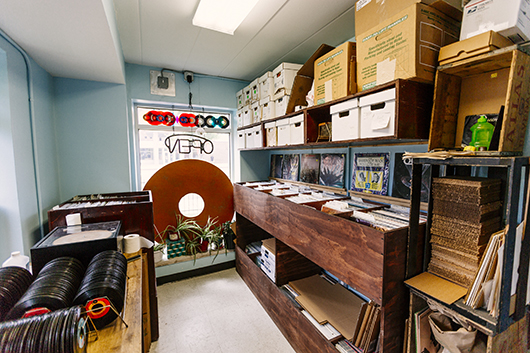
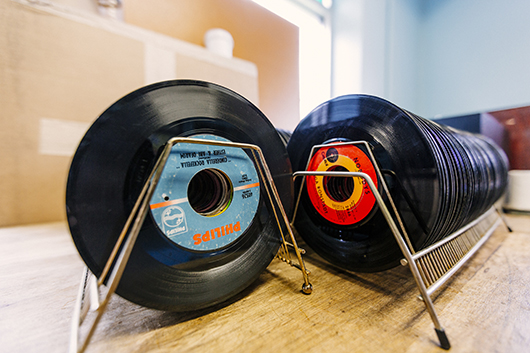
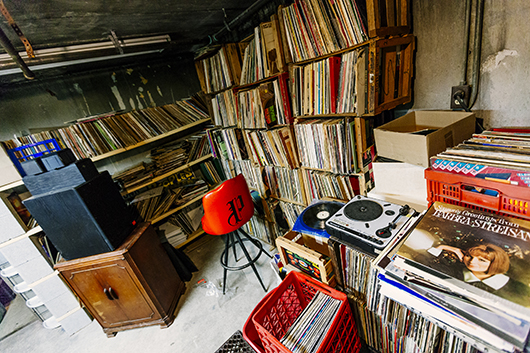
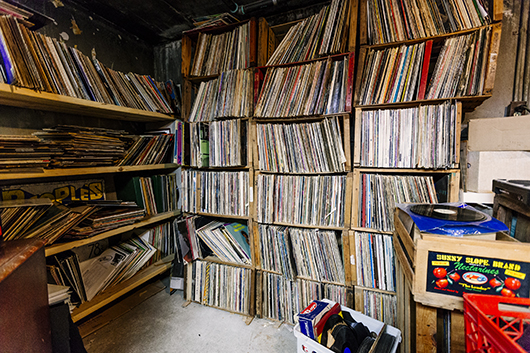
Detroit has a long history of exporting its wares outside of the city, and in that same vein, People’s Records has a global customer base. With that in mind, the store has devoted a space that was once likely a broom closet to its rarest records, many of which ultimately leave the shelves via Discogs and eBay. According to Hales, this is a necessity. “Every day that I’m open,” he explains, “I buy far more than I sell. The only way to keep that equation going, and to keep up with the buying, is to put the more expensive things online. You’ve got more dealers there for rare soul or jazz than you do fans or deep, hardcore collectors, which is disheartening.”
That said, People’s Records’ online success doesn’t detract from its local business. The store’s Detroit techno section is as large as many shops’ entire dance music sections. As one might expect, the city’s usual suspects are of course here, with new releases from local labels like Sound Signature and Wild Oats being well represented. Still, it’s People’s used offerings that make the shop a must visit for those traveling to Detroit. Between obscure soul and jazz, the early appearances of Mike Banks, and a dedicated Dance Mania section, People’s covers all the bases.
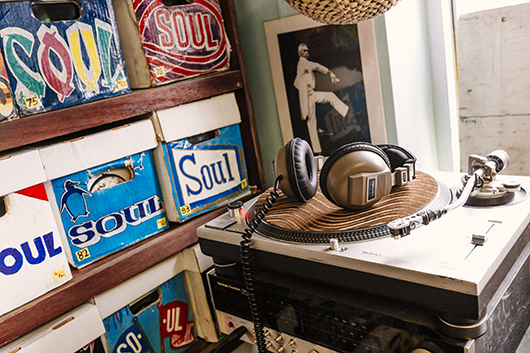
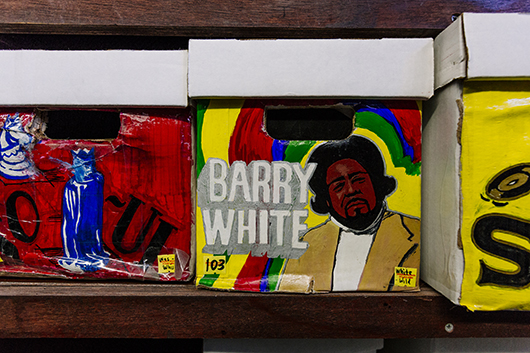
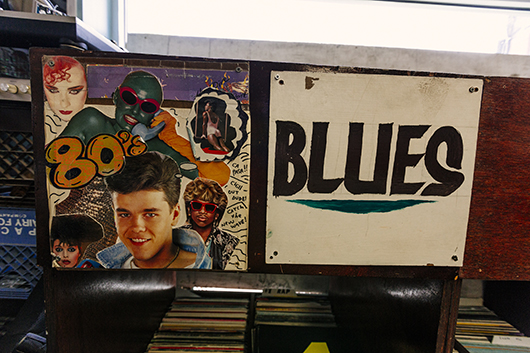
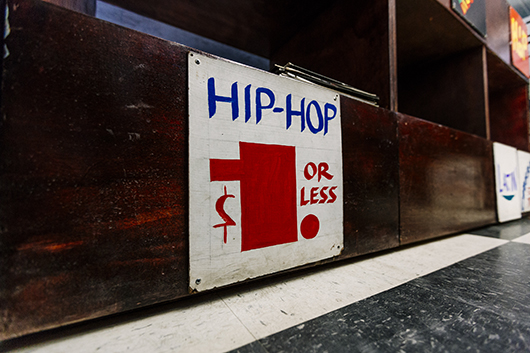
Detroit stores have had a long history of employing up-and-coming DJs who have later gone on to worldwide success, with stores like Buy-Rite, Record Time, Melodies & Memories, DJ Supply, and Vibes having employed many of today’s headliners, including Moodymann, Seth Troxler, Terrence Parker, Rick Wilhite, Houseshoes, Mike Huckaby, Magda, Claude Young, Rick Wade, Kevin Reynolds, and Dan Bell amongst many, many others. People’s Records carries on this tradition by employing Wild Oats and Trilogy Tapes artist MGUN (a.k.a. Manuel Gonzales) to tend the stacks. Hales and Gonzales initially connected during a shopping trip when the latter was a few bucks short, and later got to know each other during Gonzales’ frequent visits to the store. Through a friend, Hales eventually reached out and offered him a job. At that time, Gonzales was considering taking a job at a factory, but the People’s offer came at the right time: “It sounded much better working there than a factory,” he says. For the last nine years, when not touring or recording, Gonzales has worked at People’s Records on and off. “Its good to be there, because I get records before they hit the shelf, get to know people, hang out, and hear about what’s coming out,” he says. Kyle Hall jokingly agrees, “Manny gets all the gold at People’s, I don’t stand a chance there.”
Hall isn’t the only one looking for records. Although the media can’t seem to decide whether Detroit is decaying or rebuilding, it’s clear that the city’s record stores and vinyl culture are very much alive, even if it’s not just locals who are fueling the resurgence. “The only people you used to see from out of town were English and Japanese people who were collectors,” says Hall. Now, as DJ culture and parties are slowly coming back to the city, so are the shoppers. “Younger people between 20 and 30 are coming from out of state and Ann Arbor,” Hall says. “These are the consumers of the new Detroit stores.”
Brad Hales
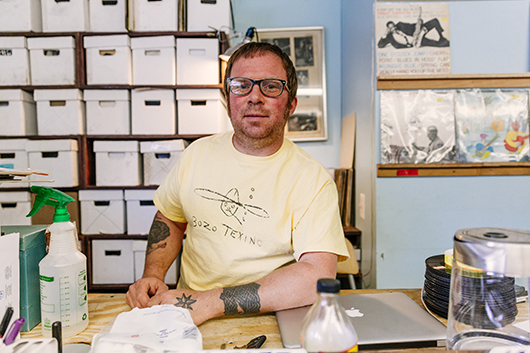
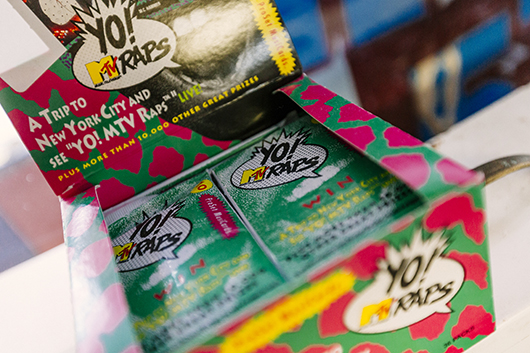
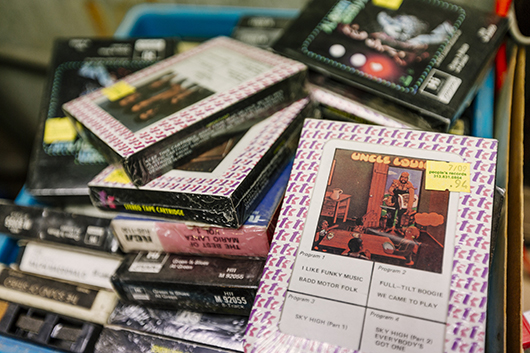
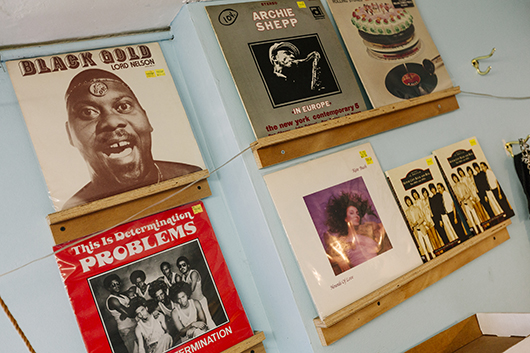
This blending is a big part of what makes People’s Records special. It’s a place where new DJs can explore the sounds of the city while rubbing elbows with veterans tracking down a second copy of a Detroit classic or former Motown session musicians from the ’60s or ’70s. They’re all regulars at People’s. According to Gonzales, his job at People’s is how he met Marcellus Pittman; working at the store, he’s also met soul musicians who were not only blown away by the selection, but by the fact that the shop had copies of albums they had played on but didn’t even own themselves. This kind of intergenerational exchange has become part of the daily routine at People’s Records, and when combined with the city’s economic and cultural revitalization, the shop has become more essential than ever, a quality that will likely only be magnified by its pending move to Detroit’s Eastern Market.
“I’m opening the Michigan Audio Heritage Society Museum there,” says Hales, “which will have different exhibitions about the history of all facets of music here in my home state, but focusing heavily on jazz and soul, two of our strongest suits. The museum, and eventually my shop, are going to be a part of a venue called Trinosophes, a cafe, gallery, and performance space that is easily the most broad-minded venue in town. They book everything from Tribe Records alumni Phil Ranelin, Underground Resistance, and next week, the Master Musicians Of Jajouka.”
Only in Detroit.
